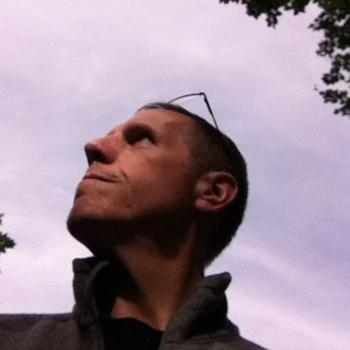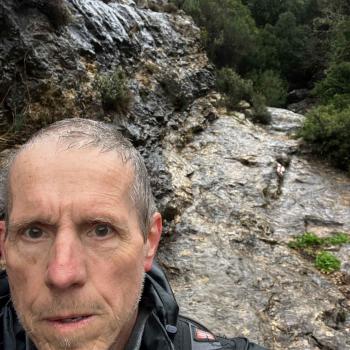Each day, while walking, ideas come to me and I think to myself, “Hold that thought until you get home and can write it down.” I rarely succeed. Call it absent mindedness, which would be true, but it is also the cost of living the Pilgrim Life.
Life vs The Meaning of Life
 You may know the quote from Søren Kierkegaard, “Life can only be understood backwards; but it must be lived forwards.” That’s the problem with pilgrim life in a nutshell. It is impossible to hold every thought you have. Other thoughts – meaning ideas but also experiences – are always coming over the transom all the time.
You may know the quote from Søren Kierkegaard, “Life can only be understood backwards; but it must be lived forwards.” That’s the problem with pilgrim life in a nutshell. It is impossible to hold every thought you have. Other thoughts – meaning ideas but also experiences – are always coming over the transom all the time.
Sorry about that. Hardly anyone knows what ‘over the transom means.’ It refers back to when doors had small windows at the top for ventilation which you opened by tilting them. Editors of books would sometimes find manuscripts in their offices thrown ‘over the transom’ and fictional private detectives might find anonymous clues in the same way.
I was talking about the inevitable tension between living fully and understanding fully. The more you do of one the less you can do of the other. That’s not counting sleeping, eating, eliminating, cleaning, all the chores being alive demands. Have you ever noticed that great books about great lives seldom if ever tell you what they ate or who did their laundry or bought their groceries or paid their bills?
I’ve made my point. Let’s move on.
As any Buddhist will tell you, and no few Hindus (looking at my friend Fred Stella who has his own column nearby) you cannot hold on to anything in life, including thoughts. Just as when we travel along a road and watch the scenery, and what we saw eventually passes below the horizon behind us while other things rise above the horizon before us, even out thoughts must pass.
Then why try to hold them at all? Because of what Søren said, to understand our lives, even if all we understand is that everything passes. That alone is worth trying to understand. What meaning can our lives have, can existence itself have, if everything passes? To go further on this question would be to enter a rabbit warren, or better a labyrinth with several Minotaurs.
Speaking of Minotaurs
My intent here was to talk about a book that contains the most robust pilgrim life I have so far encountered. I was about to start there, but Patheos always insists on a title and key phrase, so I lost the thought and ended up in the labyrinth you just traversed. Only when I found myself thinking of labyrinths as a metaphor did it remind me of the ancient myth, that it came from Crete, and that my real subject is the great Cretan writer Nikos Kazantzakis, whose spiritual authobiography makes me want to stop writing and say
“Just Read Report to Greco”
 Written at the end of his life (he lived from 1883 to 1957, seventy four years) whose most famous book, Zorba the Greek, was published when he was past seventy, Greco is operatic, stretching fact to myth. It literally combines fact with fiction, and twisting even what is true into something else. It stands halfway between confessional and Bunyan’s fantasy or Blake’s fever dream.
Written at the end of his life (he lived from 1883 to 1957, seventy four years) whose most famous book, Zorba the Greek, was published when he was past seventy, Greco is operatic, stretching fact to myth. It literally combines fact with fiction, and twisting even what is true into something else. It stands halfway between confessional and Bunyan’s fantasy or Blake’s fever dream.
What a journey it is, from Christ to Nietzsche to Buddha to Lenin and finally to Odysseus. Talk about a pilgrim life. Every page has something to say, because it was written at the end, looking backward as Kierkegaard said, over years lived eagerly forward.
“To refuse ever to deny your youth, right up to extreme old age, to battle all life long to transubstantiate your adolescent flowering into a fruit-laden tree – that, I believe, is the road of the fulfilled man.” – Kazantzakis
Few can make such a claim.











